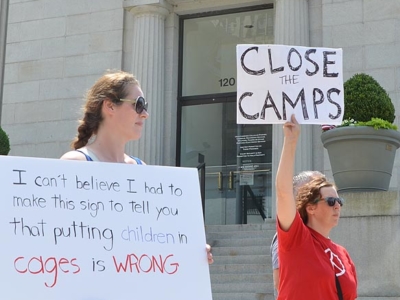Antioch University Midwest—Budget darkens union talk
- Published: December 6, 2012
Antioch University Midwest has hit difficult financial times, and the reality is affecting the local campus in several ways. This month Midwest leaders told the school community that they planned to cut $208,000 in personnel costs by the end of this year. Midwest did not specify where the cuts would come from, but indicated that the campus needed to find ways to stem a rising deficit caused by low enrollment over the last several years.
In addition, Midwest, one of five campuses that make up Antioch University, has been embroiled in a year-long negotiation with 12 of its unionized staff who have been working without an official contract since October 2011. United Electrical Radio and Machine Workers of America Local 796 and Midwest had nearly reached an agreement last April, when Midwest suddenly pulled out, according to UE’s southwest Ohio representative Dennis Painter. In September, Midwest proposed a new contract, and the UE countered, but again the process stalled.
Earlier this month, the parties brought in a mediator from the Federal Mediation and Conciliation Service to help move the talks along, and last week, according to Painter, employees learned that the university had hired a law firm from Cincinnati that specializes in union avoidance and undermining.
Midwest President Ellen Hall declined to comment on the details of both the school’s financial situation and the union negotiation process, saying that the university has “been aware that there would be a shortfall due to an enrollment downturn”… and that the university is still bargaining with the UE unit.
“We are hopeful that a contract can be worked out in the very near future,” Hall wrote in an email to the News last week.
Deficits linked to enrollment
The union negotiations are just a small part of the budgetary transition Midwest began last spring when its leaders launched “project turnaround,” an effort between Midwest and parent school Antioch University to repair the budget at the local campus. Though Midwest did not specify the level of debt the school was carrying at the time, minutes from the Board of Trustees meetings over the past year show that the campus has been in financial trouble for several years.
In June 2012 the finance committee reported that Midwest projected an operating deficit of $2 million for fiscal year 2013, saying that Midwest’s “campus reserves” had been “tapped out” to cover that and the previous year’s deficits. But records indicate that Midwest had fallen behind before then. According to the May 2011 board minutes, a board member reported that “reserves will be used to handle the deficit” of approximately $350,000. At that meeting former Midwest President Michael Fishbein told the board that Midwest was “underfunded and operating on a lean financial diet [without] important student services,” that the “costs to operate the facility were substantial,” and that the school was “tremendously tuition dependent.”
Enrollment would be critical to a tuition driven school, especially one that predicated the building of its new campus on Dayton-Yellow Springs Road on an annual 10 percent increase in students. But instead of growing, evidence indicates that enrollment at Midwest has actually shrunk.
Though the university reported over the summer that enrollment over the past three years has been “flat,” with a total full- and part-time student count of about 950 for both 2008–09 and 2010–11, other sources give a very different story. According to Painter, the university told its staff during a recent meeting that enrollment had dropped from about 800 full-time students to approximately 400. The university also told staff that the school needed to double its students in order to regain stable financial footing, Painter said last week.
To further complicate matters, in April 2012 Midwest suddenly announced that then President Fishbein would be removed from campus and placed on “a special project” with then Antioch University Chancellor Toni Murdock. The circumstances of his departure were never fully explained. But soon after Hall officially stepped in as his replacement at the change of the fiscal year in July, she said in an interview with the News that she “came into this right about the time a considerable deficit was being discovered.”
Working toward a solution
Though evidence suggests that the financial issues at Midwest were severe, the university has favored helping the local campus to cover its debt. Midwest is considered an integral part of the Antioch University system that also includes campuses in Santa Barbara, Los Angeles, Seattle and New England, as well as two university-wide programs, the PhD in Leadership and Change and Antioch Education Abroad. The whole system files revenues and expenses as a single tax entity, part of the reason budgetary information specific to individual campuses is difficult to discern.
Midwest is important first because it is considered the “home campus” for accreditation purposes for the entire university. Antioch University is currently in the middle of its 10-year accreditation process. Secondly, the whole university’s Ohio Link system is anchored by the Midwest library. And finally, according to the minutes, Midwest also holds “significant bond liability” in its new building, a $15 million project completed in 2007 with $400,000 of support from the Yellow Springs community that was used to purchase the land.
For the good of the whole, the university is invested in Midwest. And according to the 2012 board minutes, Midwest knows it. As one AUM board member put it, “We need to survive for them to survive.” So in addition to tapping its own reserves, again according to the minutes, Midwest “also tapped system reserves to cover its deficit.”
“AUM is a big risk, but the [university] Board of Governors is behind AUM. This is not a loan,” the board members agreed.
In turn, Midwest agreed to make some budget cuts and also do some things to attract and retain more students. Partly in response to complaints from faculty that there had been a lack of leadership in admissions for several years, Midwest this fall hired an executive director of enrollment. The faculty are also working on several new academic programs for the coming terms.
But budget cuts are also inevitable. According to the board minutes, campus leaders anticipated cuts such that the “deficit allows damage to run its course.” And while the university did not comment directly, Hall confirmed the pending budget cuts in a memo she circulated to union staff on Nov. 16, saying that the campus would “no doubt…need to reduce some staff and a goal of $208,000 in personnel cuts has been suggested for the last half of this fiscal year. There will be no cuts prior to January 1.”
Union negotiations
The university withdrew from union negotiations in April, the same month that Fishbein was relieved of his presidential duties. The local UE unit was shocked, according to Painter.
“We left the table before April with tentative agreements and the idea that things were going well,” he said last week. “Then in April they walked in and said, forget it.”
Talks continued through the summer, and then in September the university proposed a contract that allowed supervisors to perform some of the jobs that have traditionally belonged to the union staff. According to Painter, that clause is potentially ruinous for his clients.
“If we let supervisors (non-bargaining unit folks) do our unit’s work, then all of a sudden we don’t have 40 hours, we have 20, and then we’re forced to quit — in our business we call that ‘constructive discharge,’ and we simply can’t allow that,” he said.
The local unit offered instead to extend its current contract without increases in benefits or wages of $18–20/hour, with the union supplying the health insurance. The offer has not yet been accepted.
Then last week the UE learned that Antioch University had hired in addition to its own general counsel, the Cincinnati law firm Denlinger, Rosenthal and Greenberg. The firm advertises specialty areas including union avoidance, facilitating union breakdown and hiring striker replacements, and claims that it “has successfully negotiated hundreds of collective bargaining agreements, in both the private and public sector, which resulted in attaining or surpassing the employer’s bargaining goals.”
While the university declined to talk to the News about negotiations, in an email to staff from President Hall two weeks ago, the university denied trying to “bust the union” and said it had no plans to lay off all bargaining unit employees.
“The university Board of Governors, campus Board of Trustees and the administration are committed to turning this campus around, increasing enrollments, resolving our budget deficits and planning for a future of sustained growth,” Hall wrote in the memo.
According to Painter, who has been the UE representive for both Midwest (formerly Antioch McGregor) and Antioch College staff for 33 years, the university has never been this hard on the union. In his opinion, the university appears to be avoiding the real problem of attracting and retaining students and trying to solve its budget problems through the bargaining unit.
“They’re concentrating on the wrong thing…going after the workers is not going to solve their problem,” he said, adding that in fact, in order to attract and retain students, the university needs his unit’s expertise in admissions, counseling, registration and serving those students. “When students call, you need someone to answer the phone!” he said.
According to several Midwest staff members last week, while the employees are still willing to keep negotiating, the perception of some is that the university is not.
Midwest has said it intends to continue to serve as an educational institution, whose staff is integral to its future.
“It’s imperative to the survival of this campus, and the university as a whole, that we find ways to increase enrollment, cut expenses and balance our budget,” Hall said in her memo. “The board and administration are committed to seeing this campus through this difficult time and building a program and campus which is viable, robust, efficient and innovative so that we can continue meeting the mission of this venerable institution.”
The Yellow Springs News encourages respectful discussion of this article.
You must login to post a comment.
Don't have a login? Register for a free YSNews.com account.
Parkinsons.jpg)














No comments yet for this article.